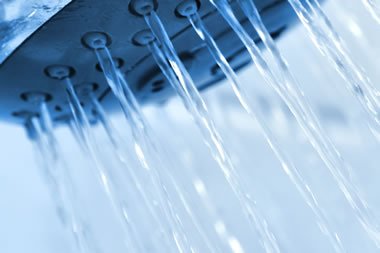Controlling Legionella in Emergency Showers & Eyewash Stations

Controlling legionella in emergency showers and eyewash stations is an essential process to help maintain workplace safety for those businesses that need to provide such emergency facilities. In this guide the water safety experts at Legionella Control International look at how these showers and emergency wash facilities can increase the risks from legionella and what practical measures can be taken to keep it under control and keep people safe.
When it comes to Legionella bacteria and Legionnaires’ disease, many people could likely name some obvious potential sources of danger – something that causes a water spray such as a shower, fountain or spa pool. However, if any type of water system, whether hot or cold, is not used for some time it can lead to stagnating water conditions which can give Legionella bacteria the chance to multiply inside the water pipes and fittings. Water kept at a temperature likely to encourage growth of the bacteria can also cause potentially serious problems.
What about legionella in emergency showers and eyewash stations?
However, unless you work in an industry where emergency showers and eyewash facilities are commonplace, you may not consider these to be a danger. That said, these showers and eye wash units are designed for occasional and emergency use only. That means there tends to be a greater risk of stagnating water conditions occurring, which are ideal for the growth of Legionella bacteria, and which could remain undetected in the system for long periods of time. If an emergency shower is not regularly checked, disinfected and flushed, it could lead to an outbreak of Legionnaires’ disease if it was forced into use for any reason.
Why are emergency showers potentially hazardous?
When an emergency shower of this type is put in to use, it may be the first time it has been used in months, if not longer. It also requires the water to be at a specific temperature to work as it should. That temperature may also be within the perfect range for the growth and multiplication Legionella bacteria. These factors can lead to contamination of the water that discharges from the shower head in the form of a spray, a potentially serious situation that must be avoided.
Similarly, if a water system of any kind is not cleaned or descaled in some time, Legionella bacteria can build up inside it, unseen yet in prime position to cause potentially significant health problems. The same applies with eyewash stations, which again may only require occasional use.
How to make your emergency showers and eyewash stations safer
Keeping your emergency showers and eyewash facilities safe is essential to protect the health and safety of your workers. A good cleaning and maintenance routine should always begin with a legionella risk assessment. The assessment should highlight the various potential dangers that could arise from the equipment. As we have seen, a lack of use and the temperature ranges required when such systems are in use can both cause legionella related issues.
A suitable maintenance routine including regular flushing, cleaning and disinfection should then be implemented. This should ensure the equipment is regularly checked to ensure it works as it should, it is clean, and flushed to minimise the risk that any bacteria could be in the water systems.
Since eyewash stations may require bottles of water for the purpose of flushing out debris in the eye, these should be labelled and disposed of once they become too old to use.
By putting proper procedures in place and maintaining them, there should be no undue danger posed by either of these emergency features in workplaces that use them.
Legionella control water safety specialists
Our teams of water safety specialists support those responsible for the control of waterborne pathogens including Legionella bacteria in the workplace, helping them to protect their people and meet their health and safety obligations in this specialist area. We deliver professional water safety risk assessments for legionella, pseudomonas and other waterborne pathogens, water testing, independent compliance auditing, City & Guilds training and other environmental risk management services that help keep staff and others safe.
If you have questions about any of the issues raised above or you would like to speak with one of our healthcare AE Water specialists please call us today on 0330 223 36 87 or contact us here.


